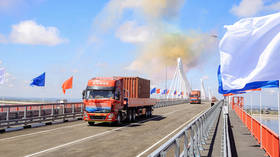Russia and China open first road bridge

The first road bridge between Russia and China opened for freight traffic on Friday amid the deep crisis in relations between Moscow and the West over the Russian military offensive in Ukraine.
Construction of the 1,080-meter-long crossing between the Russian city of Blagoveshchensk and China’s Heihe across the Amur River began in late 2016, on both sides simultaneously. The total investment amounted to 19 billion rubles ($325.4 million), 14 billion ($240 million) of which was contributed by Russia. The opening of the bridge was originally planned for November 2020 but was postponed due to the Covid pandemic.
As strict Covid rules are still in force in China, for now only trucks are allowed to cross the border.
“In today’s fragmented world, the Blagoveshchensk-Heihe bridge between Russia and China has a special, symbolic meaning. It will become yet another line of friendship connecting the peoples of Russia and China,” Russian Deputy Prime Minister Yury Trutnev said during the launch ceremony.
Chinese Vice Premier Deputy Premier Hu Chunhua also spoke of the symbolic meaning of the event. He noted that due to the link his country would be able to provide better logistics services and that the crossing was set to become “a bridge of friendship and cooperation.”
On Friday, the first eight China-bound Russian trucks from the Gazprom Helium Service fleet, powered by liquefied natural gas, crossed the bridge via the Kani-Kurgan-Heihe checkpoint. From the Chinese side, eight trucks with car tires and components for electrical equipment set off for Russia.
“I am sure that the opening of the bridge will reduce the costs and terms of transportation of goods in foreign trade,” said Vitaly Savelyev, head of the Russian Transport Ministry.
He added that the new crossing would allow cargo turnover between the two countries to reach up to 1 million tons per year.
For now, the average tariff for traveling via the bridge for one car would be 8,700 rubles (about $150), but when the cost of construction has been recouped, tariffs will be reduced, Russian officials revealed.
The idea of a “friendly border” between Blagoveshchensk and Heihe dates back to the late 1980s. The first reported deal between the two cities was made in September 1987, when a shipment of watermelons was traded for Soviet fertilizer.
In 1995, Russia and China signed an agreement to jointly construct a bridge across the Amur River. In 2015, the sides amended the agreement by signing a protocol that the governments of the Amur Region and the Heilongjiang Province would share the costs of building the bridge and set up a Russian-Chinese joint venture. This was done in order to “help preserve and develop the historical ethnic, family, cultural, humanitarian and economic ties between the citizens of Russia and China.”
Since the launch of Russia's military operation on Ukraine in late February, Western countries have imposed tough sanctions on Russia and have also criticized Beijing for refusing to condemn Moscow’s actions and for maintaining strong ties with its neighbor.













